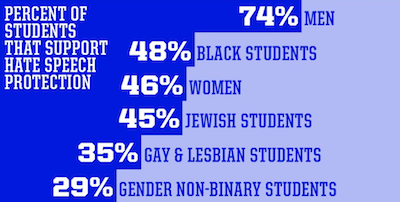U.S. college students value the protections guaranteed by the First Amendment, but appear divided on whether those protections’ ability to cover more extreme forms of speech should take precedence over efforts to promote a more inclusive society that welcomes diverse groups, according to a recent Knight Foundation report.
The report, which sought to better understand current opinions regarding free speech and inclusion at universities around the country, found that nearly six in 10 college students (58 percent) believe hate speech should remain protected under our First Amendment, versus 41 percent who do not.
More division appears, however, when students were asked to prioritize protections to free speech or strides to promote an inclusive and welcoming society. According to the report, a slight majority (53 percent) of students said they favor free speech rights above all, though nearly as many (46 percent) said inclusivity is a more important value.
 |
The study discovered these opinions are especially divided when respondents’ race, gender and sexual orientation come into play. 58 percent of college women believe promoting an inclusive society is a value more important than protecting free speech, while 71 percent of college men favor protecting free speech over inclusivity. White college students were also more likely (58 percent) to hold the belief that protecting free speech rights should be a higher priority over inclusivity, while 60 percent of black students said inclusivity is a more important value.
Nearly three-quarters (74 percent) of college men believe hate speech should be protected by the First Amendment, compared to only 53 percent of college women. Nearly two-thirds (62 percent) of students identifying as white believe hate speech should be protected, compared to less than half (48 percent) of those identifying as black. About a third (64 percent) of heterosexual students think hate speech should remain protected, compared to only about a third (35 percent) of gay/ lesbian students.
The report also found that while more than half (53 percent) of white students believe it’s never acceptable to prevent someone from expressing their views on campus, only 41 percent of Hispanic students, 38 percent of black students and 37 percent of Asian Pacific Islander students agree with this statement.
On the other hand, most students seem to agree that the current political and social climate on college campuses is stifling free expression: a majority (68 percent) believe our current climate precludes students from expressing their true beliefs out of fear of offending their classmates, more than twice as many as those who do not (31 percent).
The Knight Foundation report, “Free Expression on College Campuses,” polled 4,407 full-time college students enrolled at four-year degree programs across all 50 states. The survey was conducted in December online and via mobile app by analytics company College Pulse.


 Real Chemistry has hired Wunderman Thompson’s Andy Johnson as chief information officer.
Real Chemistry has hired Wunderman Thompson’s Andy Johnson as chief information officer. The communications industry is often so caught up in the role of measurement that it loses sight of arguably the most important component in the measurement mix—the client’s bottom line.
The communications industry is often so caught up in the role of measurement that it loses sight of arguably the most important component in the measurement mix—the client’s bottom line. Imre has recruited Atul Sharma, who was VP-analytics at Porter Novelli, for the senior VP-intelligence slot.
Imre has recruited Atul Sharma, who was VP-analytics at Porter Novelli, for the senior VP-intelligence slot. Some of the ways in which analytics and artificial intelligence are transforming today’s communications landscape.
Some of the ways in which analytics and artificial intelligence are transforming today’s communications landscape. Edelman has launched a disinformation offering to help clients combat deceptive and false material with fact-based communications.
Edelman has launched a disinformation offering to help clients combat deceptive and false material with fact-based communications.


 Have a comment? Send it to
Have a comment? Send it to 
No comments have been submitted for this story yet.